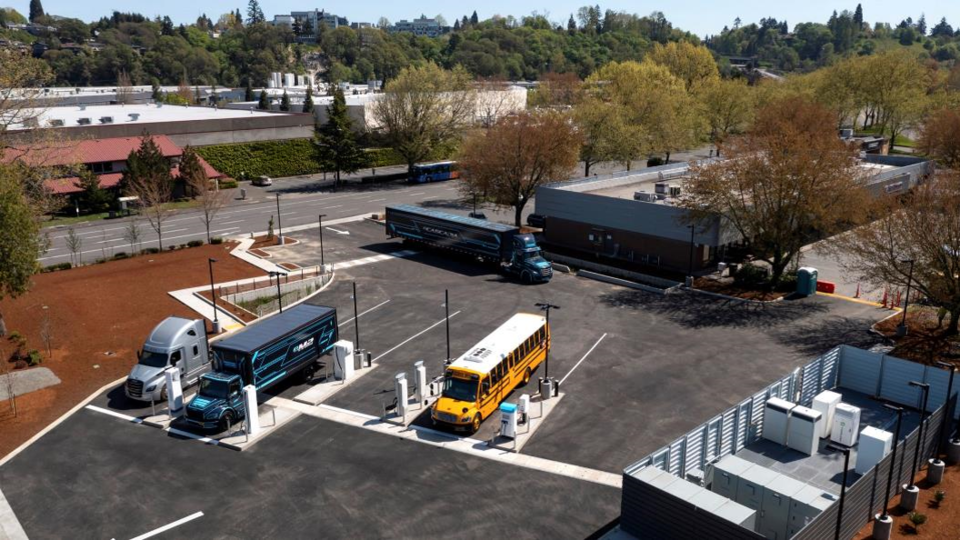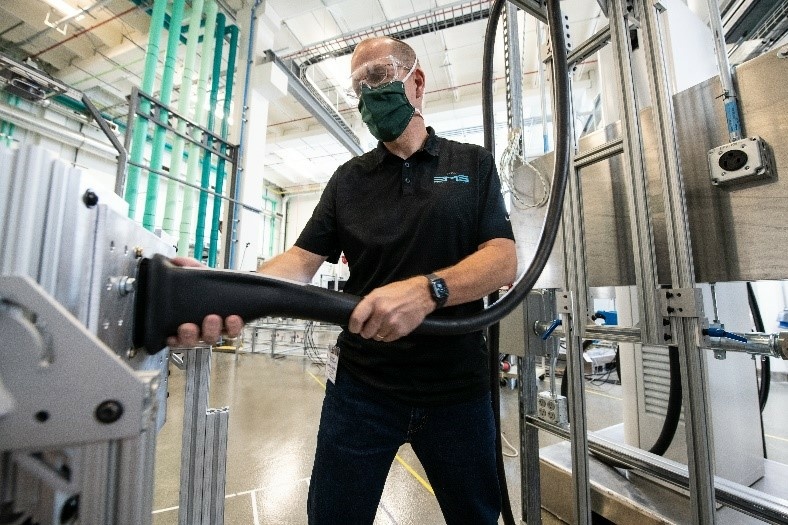
To give an answer to global challenges like CO2 reduction and energy saving, the automobile industry has been accelerating the development and commercialization of electric vehicles (EV), and hybrid electric vehicles. But climate-friendly mobility is not just limited to passenger cars. Most of the goods are transported by trucks, ships or planes, a different dimension if we think about clean transportation. Due to size and weight of these transport options, user-friendly and quick High Power Charging is the key to increase the acceptance of e-mobility also in this area.
To satisfy the market demand of the Truck and Bus industry to charge electric heavy-duty vehicles within a reasonable time, a new solution for high-power charging is needed. It will help meet climate and sustainability goals and offer maximized customer flexibility. Not just the truck industry will benefit from this solution. Other applications like Maritime and air vessels may use this charging system to fulfil their needs, too.
Therefore, batteries with larger capacities need to be taken in consideration. To charge those large capacity batteries in comparable times as today available or even faster, the charging power needs to be increased. Besides the charging voltage also the charging current needs to be increased to boost the charging power.
The larger charging current lead to either larger conductor cross sections for the cable assembly according to existing standards or additional measures in the cable assembly both still allowing for manual charging by the customer/ driver without the help of a supporting machine or robot.
CharIN and the Megawatt Charging System (MCS)
In 2018, CharIN initiated the Task Force "Megawatt Charging System (MCS)" to invent a holistic system approach based on the Combined Charging System CCS. The CharIN Megawatt Charging System (MCS) Task Force represents the whole value chain of the Heavy Duty Vehicles industry segment which ensures that all perspectives are considered.
Today, they constitute an integral part of the CharIN Focus Group "Charging Connection" since also light electric airplanes, ferries, and other marine vessels go electric, the work of the Megawatt Charging System (MCS) group is essential in the field of extended applications.
CharIN helps the industry create a common solution for charging their electric heavy-duty vehicles within a reasonable time.

CharIN MCS Construction Layout
First of it’s kind public electric truck charging site in Portland, Oregon. Partnership between Portland General Electric and Daimler Trucks North America (PGE & DTNA). The place is prepared for installation of MCS charger and Battery Storage.
The following requirements for the Megawatt Charging System (MCS) are currently discussed:
Recommendations and requirements for MCS related standards bodies and solution suppliers:
- Single conductive plug
- Max 1.250 volt & 3.000 ampere (DC)
- Ethernet + ISO/IEC 15118-20
- Touch Safe (UL2251)
- On-handle software-interpreted override switch
- Adheres to OSHA & ADA (& local equivalent) standards
- FCC Class A EMI (& local equivalent)
- Located on left side of the vehicle, roughly hip height
- Capable of being automated
- UL (NRTL) certified
- Cyber-Secure
- V2X (bi-directional)
The CharIN Task Force "Megawatt Charging System (MCS)" was formed with the following Purpose Statement:
“Work out requirements for a new commercial vehicle high power charging solution to maximize customer flexibility when using fully electric commercial vehicles. The scope of the technical recommendation is to be limited to the connector, and any related requirements for the EVSE, the vehicle, communication, and related hardware.”
The standard focuses on Class 6, 7, & 8 commercial vehicles, but could easily be used for buses, aircrafts, or other large battery electric vehicles (BEVs) with huge battery packs and ability to accept a >1MW charge rate.
The Megawatt Charging System (MCS) shall comply with the holistic system approach of the Combined Charging System CCS.
With respect to the vast amount of CCS engineering expertise a maximum utilization of existing CCS building blocks and its related standards secures quality and reduces time to market. Compatibility will be a key success factor for market introduction and market stability.

The following requirements need to be fulfilled by the solution:

The Task Force Megawatt Charging System (MCS) is now focused on iterative testing and validation of the selected features: Ongoing regular technical meetings discuss details of the future standard, including initial voltage range, current capability, and associated thermal performance, plug/socket geometry, fit, function, etc.
The ultimate goal of the task force is creating a complete requirements and specification document including the plug geometry. This document shall be completed by end of 2022.
- Megawatt Charging System (MCS) Up to 1250 V and 3000A
- In compliance with power classes, as defined by CharIN
- Usability of Megawatt Charging System (MCS) – Infrastructure for 1000V/500A medium power supply (current CCS connector)
- Coverage of Megawatt Charging System (MCS) power demand via ,,add-on power extension modules” to the existing connector
- Communication and basic safety concept shall be compliant with CCS standard
- Common set of documents at the interface EV-EVSE for requirements and test cases of Megawatt Charging System (MCS)
- Charging use-cases as baseline for requirements and definitions comparable to existing high/medium power solutions
- Support of reverse power transfer for Megawatt Charging System (MCS)
- Automated Conductive Charging as a second step for Megawatt Charging System (MCS)
Megawatt Charging System (MCS): Successful connector test event at NREL
On September 23-24, 2020, another milestone in the development of compatible inlet and connector designs for medium- and heavy-duty electric vehicles was reached.
At the facilities of the National Renewable Energy Laboratory (NREL) cross-industry representatives tested, provided feedback, and evaluated the compatibility of inlet and connectors for megawatt chargers. Among them were leading OEMs, utilities, equipment manufacturers, and component suppliers.
This event enabled seven vehicle inlets and eleven charger connectors to test their designs together. NREL’s facilities offered a convening location to compare components across the seven different manufacturers represented with prototypes in the hardware evaluations with another six manufacturers participating virtually. Features like the fit, the ergonomics, the easy connection and disconnection, and the thermal performance of the connectors and inlets were tested and evaluated by the participants. These are valuable results for optimizing, further developing the standard, and to ensure consistent performance across connector and inlet designs. The event was followed by a virtual CharIN Megawatt Charging System (MCS) Task Force meeting to review the evaluations.
The common goal of this event was to support the creation of a global Megawatt Charging System (MCS) standard to ensure the compatibility of connectors and inlet hardware from different manufacturers. Especially the American CharIN member community contributed with the organization of this event and the valuable feedback to further development of an industry standard for megawatt chargers. The new CCS based standard will streamline market introduction and encourage market stability.

Thank you sponsors!
The NREL test event was sponsored by the Department of Energy, the California Energy Commission, the South Coast Air Quality Management District, Daimler Trucks North America, Gladstein, Neandross & Associates, and CharIN e.V..

